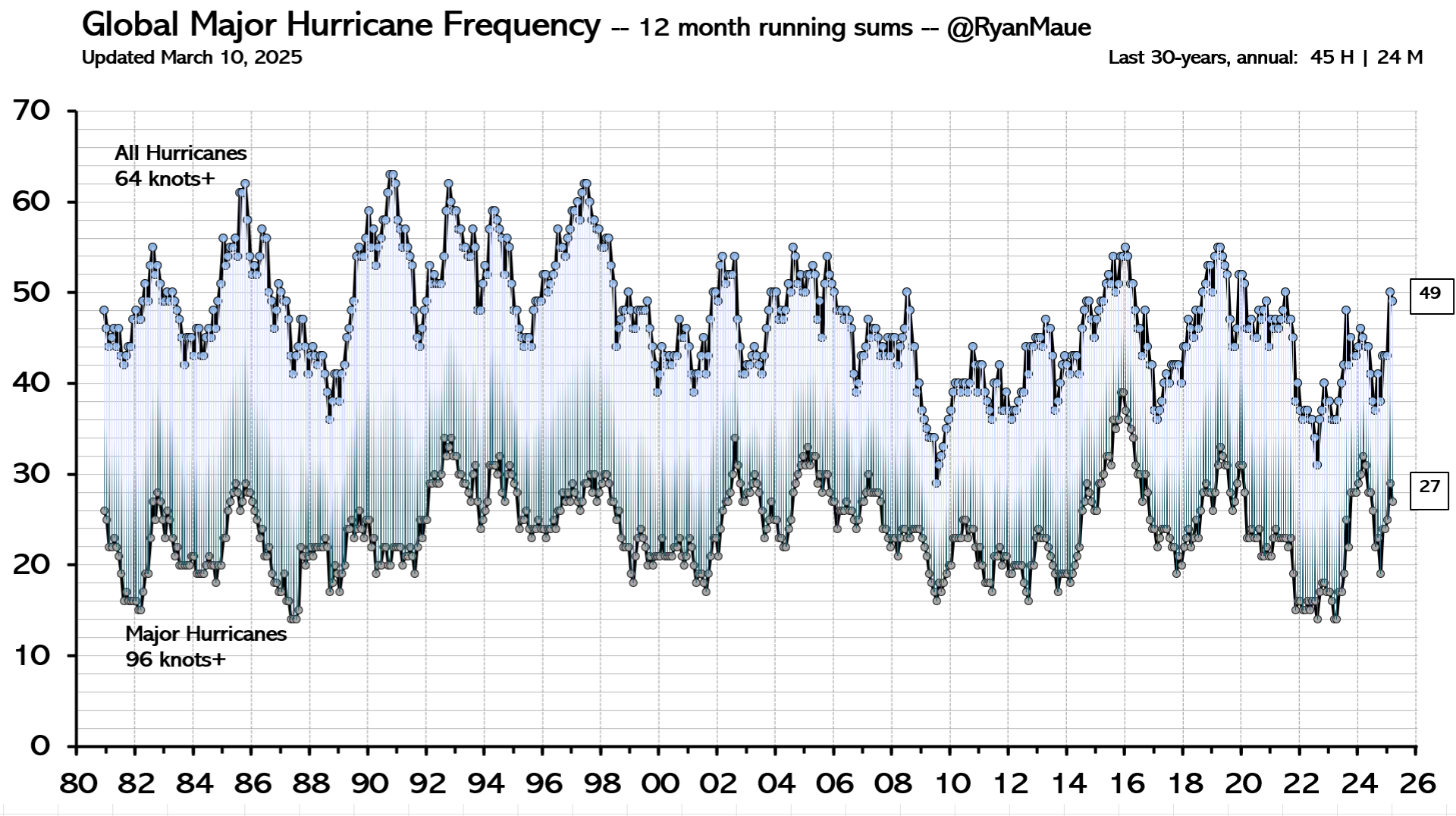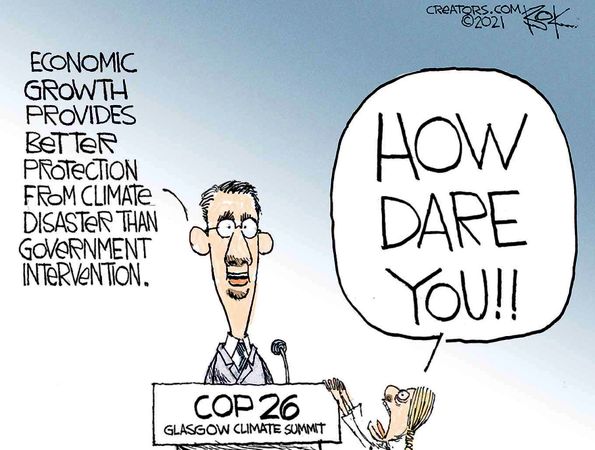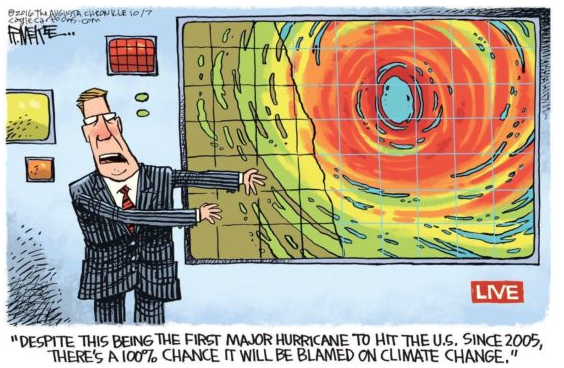Jeffrey Folks writes at American Thinker How Terrified Should We Be of Hurricane Season This Year?. Excerpts in italics with my bolds and added images.
Once again, as nearly every year, officials at NOAA and other agencies called for 2022 to be a “very active” hurricane season. In its May 24 release, NOAA predicted “an “above-average hurricane activity this year — which would make it the seventh consecutive above-average hurricane season.” It’s like the old joke that everyone’s grandkid is “above average”: for some reason, every hurricane season, the risk is now “above average.”
I don’t know how every year can be “above average,” something that defies the laws of statistics. I suspect that it has to do with the strong bias of climate scientists rather than the strength of hurricanes. And in fact, hurricanes have been “fewer than average” this year and for many years recently.
So far, halfway through the hurricane season, no Atlantic storms have made landfall on U.S. soil.
This lack of severe storms defies the dire predictions of global warming alarmists: that rising temperatures will cause catastrophic storms. In reality, one reason why there are fewer and less severe storms this year is that the Atlantic waters have been cooler than usual. That, combined with drier air over the Atlantic, caused by the atmospheric drift of Saharan dust, has caused potential tropical storms to dissipate.

Predictions of “very active” storm seasons are widely publicized each spring, but the reality of fewer and less severe storms never makes its way into the media.
The truth is that some hurricane seasons are more active and some less so. The same is true of tornadoes, droughts, floods, and other natural phenomena. But only the extreme events get publicized and treated as confirmation of climate change. If the media were honest, they would report the truth that the weather has not changed a great deal, at least not since the end of the Little Ice Age in 1850 — and the warmer temperatures since then have been a blessing.
Global temperatures have risen one degree Celsius since the low point of 1850, so severe storms may be somewhat more common than in the distant past. But death rates have dropped precipitously. The worst hurricane in American history was the Great Galveston hurricane of September 8, 1900, which killed some 8,000 people. The worst tornado recorded in U.S. history was the Tri-State Tornado of March 18, 1925, which killed 751 people. Both of these storms occurred long before the period in which alarmists like Al Gore predicted that global warming would cause catastrophic storms — and clearly, they were not “man-made.”
We are safer now because of technology. With advance warning, populations can take shelter or evacuate, and a smartphone or weather radio is all that is necessary to receive warnings. As warning systems become more sophisticated, fewer people will die or be injured by severe weather events. But the development of those systems depends on the ability of individuals to pay for them, and recent government spending will make that less likely — just as it will affect medical research, transportation safety, and police protection.
In addition to the “regular” budget of $5 trillion, this year, Biden has appropriated $7 trillion in emergency spending, much of it for climate change. But that money is not intended to protect us from severe storms. It is being spent on green energy boondoggles that enrich connected insiders but impoverish average citizens. And that impoverishment is the heart of the problem.
With less wealth, it is more difficult to protect oneself against severe weather. Even in years like 2022, which have so far been less active than normal, homeowners must be vigilant if they live along the Atlantic Coast, especially in Florida and other hurricane-prone states. Three months of the hurricane season remain. The odds are that an Atlantic hurricane will strike the East Coast. If a hurricane does make landfall, the media will tout it as proof of the catastrophic effects of global warming. In reality, it will just prove that the climate hasn’t changed much.
Since the destructive 2004 hurricane season, Florida has required all new construction to incorporate tie-down roofing and storm-resistant glass, measures that have made life safer for residents. And since taking office, Gov. Ron DeSantis has maintained storm preparedness and worked to protect citizens of Florida.
But Biden’s ludicrously entitled “Inflation Reduction Act” does nothing to strengthen homes and businesses. Its primary aim is to reward Democrat donors, including unions and green energy corporations. How does the mandate of a “union wage” included in the bill help protect Americans against severe storms?
But prosperity really is the solution to global warming. There may or may not be more severe storms this year or the next. Human beings have no control over that. But they can control how well prepared they are for the events — that is, if government leaves them with enough money to do so.

See also Hurricanes Unrelated to CO2

Integrated Storm Activity Annually over the Continental U.S. (ISAAC)



The view of reality that is presented in the blog “RealClearEnergy” is distorted by “community standards,” as I discovered this morning when I received notice from this blog’s owner that he/she had blocked my attempt at posting a comment on an article that had previously been published in this blog. This notice said:
Comment Rejected
Your comment has been rejected as it does not align with our Community Guidelines.
The view of reality that is presented in RealClearEnergy contends that nothing is logically or scientifically amiss with the argument made by a modern climate model. Had it been published, my comment would have refuted this contention
LikeLike
Terry, over time I’ve noticed on Real Clear Energy some alarmist and some skeptical articles. I guess it depends on the editors, but I am surprised that your comment was rejected. I have not attempted to comment there, I take content I find persuasive and leave the rest aside.
LikeLike
Excellent report… thanks. Living on the central east coast of Florida, we keep an eye on any potential storms. We’re into the last week of August and so far, nothing resembling a threat. The NHC is typically a much more reliable source for hurricane information than the NWS, though they’re both part of NOAA. Even NHC was doing its best to warm up the “scare” machine by reporting a disturbed area for three days that had virtually zero chance of becoming a tropical cyclone. It gets silly after awhile. Thanks for the embedded cartoons… one must preserve a good sense of humor at these times!
LikeLike
Currently I am in a dialogue with a NOAA researcher who finds it impossible to believe that runs of modern climate models provide a regulatory official with no information about the conditional outcomes of the events of the future for Earth’s climate system. He finds this impossible to believe though I have provided him with a deductive proof of this allegation that he is unable to refute.
LikeLike
Reblogged this on Climate Collections.
LikeLike